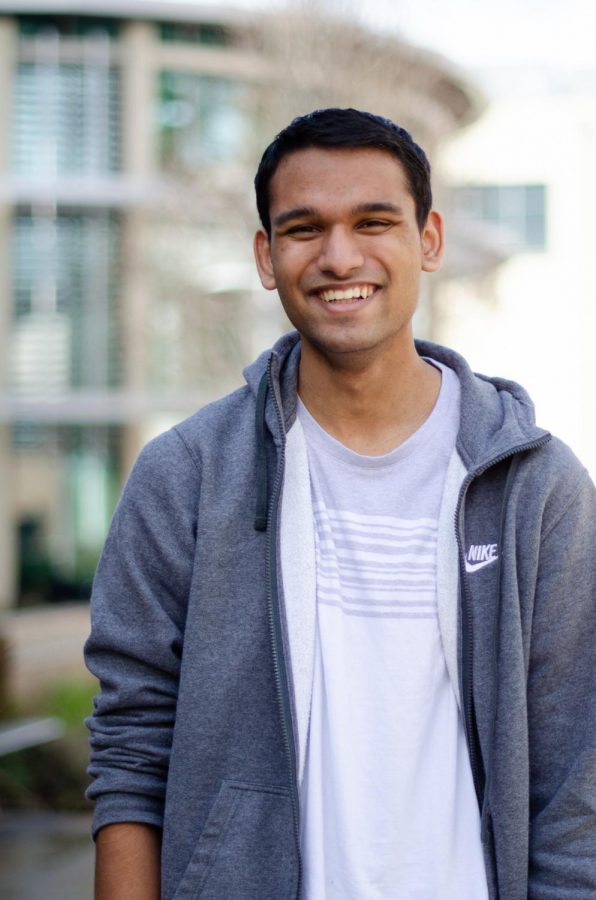Humans of Harker: Informed discourse
Jay Menon balances passionate speech with consideration
“Whatever side of the political spectrum you fall under, a lot of things you might think are true are not true if you delve a little deeper,” Jay said. “It doesn’t mean you stop supporting whatever you support, I think it’s more important, but I think you sound more educated with you present a point with evidence to back it up,” Jay Menon (12) said.
When he’s with his friends, Jay Menon (12) speaks quickly, delivering concise, acerbic remarks by the minute, then laughing assuredly at his friends’ responses, a confident, calm smile on his face. He speaks his mind, as he always does, but considers his replies before he retorts.
Though Jay’s candid nature captured Suraj Pakala’s (12) attention in 6th grade, they did not become friends until 7th grade, when they bonded over shared classes, such as P.E. Since then, Suraj has been able to depend on Jay.
“I can always place my trust in him and not be judged for whatever I say,” Suraj said.
Jason Huang (12) has had a similar experience with Jay, getting to know him as a trustworthy, loyal person who is willing to support his friends, even when they make poor choices.
“He’ll tell you that you’re dumb, and he’ll tell you’re completely wrong, but the moment that you need him to step up for you, he’ll do that,” Jason said.
Jay’s frankness also shows itself when those around him are going through more difficult times. Devanshi Mehta (12), who met Jay in her 8th grade Biology class, knows him to be consoling in an unconventional way.
“He has this way of being kind of comforting but in a health-check kind of way. He won’t give you, ‘Oh, everything’s always going to be okay’,” Devanshi said. “If my life is falling apart, he will be like, ‘Devanshi, get your stuff together’.”
To Devanshi, Jay’s ability to comfort by focusing on the facts of the problem at hand rather than sentiment is an important quality for a friend to have.
“If friends only tell you what you want to hear all the time, they’re not really your friends because they don’t want what’s best for you,” Devanshi said.
In addition to Jay’s reliable nature, Jay’s rational approach to discourse has also become apparent to his friends.
“I really respect how he prioritizes negotiating, compromising, with other people,” Jason said.
Though Jay is quick to speak, he doesn’t spew information without considering it first; for example, Jay bases his arguments on facts at the Political Roundtable, a lunchtime meet-up where students can discuss topical political issues, organized by Jason.
“One thing I’ve noticed about Jay is that everything he says has actual evidence behind it. Even in arguments, he gets into with about people or social arguments, he won’t say something unless there are facts behind it, whereas other people will say some things just to win,” Suraj said.
Logic and reasoning are a significant part of Jay’s worldview. His commitments both inside and outside of school are data-driven, emphasizing research; for instance, Jay is currently doing a data science internship at El Camino hospital.
A fan of politics, Jay also tracks current events and collects information about them.
“It’s very obvious that he cares a lot about his community and about being an active member,” Jason said.
He approaches controversial issues in the news methodically, looking at non-partisan sources of information first to avoid confirmation bias.
“I don’t like just sticking to one news source, even if I really disagree with a news source, even if they’re completely ridiculous, I’ll still read them to see what they have to say,” Jay said.
According to Jay, a lot of people tend to base their opinions on their own sentiment or that of those surrounding them. Instead, Jay thinks that it’s best to see the data before choosing a side.
“Whatever side of the political spectrum you fall under, a lot of things you might think are true are not true if you delve a little deeper,” Jay said. “It doesn’t mean you stop supporting whatever you support, I think it’s more important, but I think you sound more educated with you present a point with evidence to back it up.”

Irina Malyugina (11) is the photo editor of Harker Aquila and the Winged Post. This is her third year on staff. She has a passion for visual storytelling...
Devanshi Mehta is a sophomore and Co-Business/PDA Manager for TALON Yearbook. This is Devanshi's second year on staff. In her free time, Devanshi enjoys...


















![“[Building nerf blasters] became this outlet of creativity for me that hasn't been matched by anything else. The process [of] making a build complete to your desire is such a painstakingly difficult process, but I've had to learn from [the skills needed from] soldering to proper painting. There's so many different options for everything, if you think about it, it exists. The best part is [that] if it doesn't exist, you can build it yourself," Ishaan Parate said.](https://harkeraquila.com/wp-content/uploads/2022/08/DSC_8149-900x604.jpg)




![“When I came into high school, I was ready to be a follower. But DECA was a game changer for me. It helped me overcome my fear of public speaking, and it's played such a major role in who I've become today. To be able to successfully lead a chapter of 150 students, an officer team and be one of the upperclassmen I once really admired is something I'm [really] proud of,” Anvitha Tummala ('21) said.](https://harkeraquila.com/wp-content/uploads/2021/07/Screen-Shot-2021-07-25-at-9.50.05-AM-900x594.png)







![“I think getting up in the morning and having a sense of purpose [is exciting]. I think without a certain amount of drive, life is kind of obsolete and mundane, and I think having that every single day is what makes each day unique and kind of makes life exciting,” Neymika Jain (12) said.](https://harkeraquila.com/wp-content/uploads/2017/06/Screen-Shot-2017-06-03-at-4.54.16-PM.png)








![“My slogan is ‘slow feet, don’t eat, and I’m hungry.’ You need to run fast to get where you are–you aren't going to get those championships if you aren't fast,” Angel Cervantes (12) said. “I want to do well in school on my tests and in track and win championships for my team. I live by that, [and] I can do that anywhere: in the classroom or on the field.”](https://harkeraquila.com/wp-content/uploads/2018/06/DSC5146-900x601.jpg)
![“[Volleyball has] taught me how to fall correctly, and another thing it taught is that you don’t have to be the best at something to be good at it. If you just hit the ball in a smart way, then it still scores points and you’re good at it. You could be a background player and still make a much bigger impact on the team than you would think,” Anya Gert (’20) said.](https://harkeraquila.com/wp-content/uploads/2020/06/AnnaGert_JinTuan_HoHPhotoEdited-600x900.jpeg)

![“I'm not nearly there yet, but [my confidence has] definitely been getting better since I was pretty shy and timid coming into Harker my freshman year. I know that there's a lot of people that are really confident in what they do, and I really admire them. Everyone's so driven and that has really pushed me to kind of try to find my own place in high school and be more confident,” Alyssa Huang (’20) said.](https://harkeraquila.com/wp-content/uploads/2020/06/AlyssaHuang_EmilyChen_HoHPhoto-900x749.jpeg)



